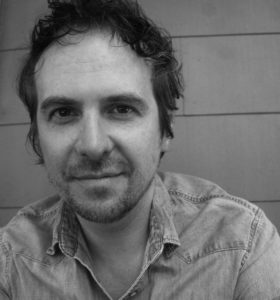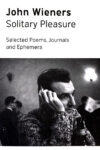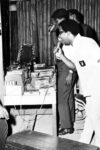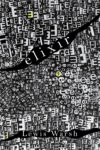 Astral Weeks: A Secret History of 1968 is not the book, based on its title, that you might be expecting. It begins not in 1968 and not with Van Morrison, but in 1965 at the end of the notorious “Dylan goes electric” Newport Folk Festival. Mel Lyman, a member of Jim Kweskin’s Jug Band is escorting the bewildered folkies out of the festival with a thirty-minute version of “Rock of Ages.” This is of course before he comes to believe that he is God and founds a commune that will interact with figures as diverse as Howard Zinn and Michelangelo Antonioni. And when we get to Van Morrison and 1968 it is not Chicago, San Francisco, New York, or Memphis that is our concern, but BOSTON, the last place you’d expect to find this tumultuous year spiraling out in wild and uncontrollable directions. Boston owes Ryan H. Walsh a debt of gratitude for unearthing this strange chapter in the city’s history. We’ll leave the details to Ryan, who in addition to being behind the rock band Hallelujah the Hills clearly has an ear for a good story.
Astral Weeks: A Secret History of 1968 is not the book, based on its title, that you might be expecting. It begins not in 1968 and not with Van Morrison, but in 1965 at the end of the notorious “Dylan goes electric” Newport Folk Festival. Mel Lyman, a member of Jim Kweskin’s Jug Band is escorting the bewildered folkies out of the festival with a thirty-minute version of “Rock of Ages.” This is of course before he comes to believe that he is God and founds a commune that will interact with figures as diverse as Howard Zinn and Michelangelo Antonioni. And when we get to Van Morrison and 1968 it is not Chicago, San Francisco, New York, or Memphis that is our concern, but BOSTON, the last place you’d expect to find this tumultuous year spiraling out in wild and uncontrollable directions. Boston owes Ryan H. Walsh a debt of gratitude for unearthing this strange chapter in the city’s history. We’ll leave the details to Ryan, who in addition to being behind the rock band Hallelujah the Hills clearly has an ear for a good story.
Michael, Alex, and Jesse: In the preface you write, “This is a story about Boston before tech innovation and athletic dominance became the city’s calling cards – back when LSD and the occult, protest and serial murders were the subjects of most national news stories about life inside the Cradle of Liberty….looking back on Boston in 1968 is like catching the glimpse of an upside down, hallucinogenic version of the thriving metropolis that stands today.”
What sense did you have before starting the book that this upside down world would turn up? I [Michael Schapira] ask because the Boston I see in the book is nothing like the Boston I knew growing up, or as a young adult, or now, which I wouldn’t describe as weird. Even if you go back and look into all of the wild cults and fanaticism in 19th century America, Boston was way lamer than other places in the Northeast. When did you first get intimations that Boston had this secret history?
Ryan Walsh: Almost none. Even hearing, “yeah yeah there was a venue called the Boston Tea Party. Zeppelin played there,” didn’t give me any indication of how unusual the venue, and the local bands, and the scene around it really were. When I was growing up, we only went into the city to see the Red Sox play, really. My first cultural experience in town was during freshman year of high school when we saw that free Green Day show at the Hatch Shell that devolved into a riot.
Shortly after that, I started getting out to see cool local bands like Morphine play at the Middle East. I knew the scene didn’t sprout out from nowhere, but there was no one evangelizing for you to go check out local weirdo history. That chapter in Our Band Could Be Your Life does such a good job bringing 80’s Boston and Mission of Burma to life, but where were the documentaries or full books in that great storytelling style about what came before?
It wasn’t until my editor and I stumbled upon the idea that the late-sixties counterculture surrounding Van Morrison’s Cambridge residency might reveal some clues or interesting stories that I went digging. Within a week I had learned about the Bosstown Sound and the Fort Hill Community and I knew there was a big, rich, connected story waiting to be told.
There is a really digressive (or maybe panoramic) quality to the book, and it reminded us a lot of When Giants Walked the Earth, the book about Led Zeppelin that would leave the band for whole chapters to give you the history of Aleister Crowley and black magic’s place in 1970s rock. When did you realize that you really had to start pushing the edges of this story that was ostensibly about the creation of Astral Weeks? Did you have any models in mind in how to hold all of these threads together?
As far rock history books go, no. My models for how to structure a story are more like, David Lynch movies and DFW’s Infinite Jest. If you’re in the right hands, not only should you not mind a drifting from the main storyline, but you should start to feel like, “Ohhh, this is going to enrich the main thing if I’m just patient.” After I finished the film chapter, I did start to think, “well, I’m gonna lose some people with this chapter, but it’s everything I love about storytelling.” I truly love plays within the play and similar self-referential moments in movies and books. So a chapter about people losing the distinction between fiction and reality right in the middle of a non-fiction book, to me, made perfect sense.
We’re at the 50th anniversary of 1968, which is to say peak boomer nostalgia. Could a boomer responsibly write this history (i.e. get how truly weird the story was)? You’ve been on book tour. What has been the boomer response to the book? Or more generally, given Astral Weeks’ magical quality in which every generation can have an emotional attachment to it, have you noticed generational differences in how people are reacting to this history?
I’ve been thinking about this a lot. The response has been overwhelmingly positive, but there have been some baby boomers who seem to be bothered that a person under 40 wrote this book. I think you’re exactly right, they couldn’t quite see the weirdness like I could because it was like air around them in their POV/memory. And in fact, often when I read these folks’ memoirs, that was exactly the case. Their accounts of these events are often very matter of fact. I’m quite certain that in fifty years, I’m going to be totally ripshit at the 35 year old who writes the perfect book about the 00’s or this decade, for instance. I’ll be like, “I toured with the Silver Jews and Titus Andronicus! Why didn’t anyone publish my memoir of this scene?” And then my nurse will tell me to settle down.
These are different eras and different levels of serious artistic merit, but both are inexplicable in their own ways…where does Van Morrison’s performance in The Last Waltz rank in the moments of his career that can only be explained by some sort of divine inspiration or ecstatic channeling of the beyond?
Everyone loves to conjecture who’s on what drug and how much of it in regards to The Last Waltz. Boring! What I see when I watch that fantastic Van Morrison performance of “Caravan” is a guy who’s totally psyched that he’s finally been accepted by his peer group. Like I outline in the book, Morrison paid his dues a couple times over. He longed to be friends with Dylan in Woodstock. The Band seemed to tease him or keep him around as a mascot at first. For him to be invited to that show with Joni, Neil, Bob and all the others, I imagine that meant a ton to him and it comes through in the performance. I never get tired of watching that. Love that look at the end that Robertson and Danko exchange like, “well that was something, huh.”
Most of the attention that the book has gotten is about Van Morrison, but in many ways Mel Lyman is the central figure, at least for the secret history part. What impression did you leave with of Mel Lyman? He seemed clearly to be a really dark person, but the Fort Hill Community also seemed remarkably cohesive or at least durable in times of real crisis.
Lyman and Morrison as our dual tour guides is an unusual idea. I get that. But the fact that in 1968 Mel was famous, Van was unknown, and they were both searching for spirituality through music in Boston made them instant thematic twins, in my mind. The fact that they ended up in such crazy, different places, too, lends itself to a natural story arc as well.
With both of them, I didn’t want to paint a cartoon version of a person. When people I interviewed said good or bad things about either of them, I made sure to include it. I gave all point-of-views a fair shot here. Like, for instance, I was kind of shocked when filmmaker Jonas Mekas said that Lyman could do no wrong and it was ok that he ran a private prison in the basement of one of those houses. If I wanted to present a narrow representation of Lyman, I would have left that out.
But all that said, I find Lyman’s use of hallucinogens to control people reprehensible. His homophobic and racist remarks are complete garbage.
There are very few heroes in the book. Just people doing people things; continually fucking up and sometimes making something beautiful.
The Bosstown Sound produced some (in our opinion) spectacularly stupid band names. You’ve got a bunch in your book, including: Puff, Quill, Ill Wind, Phluph, the Apple Pie Motherhood, Butter, Listening, A Warm Puppy, Fort Mudge Memorial Dump, Third World Raspberry, and Good Tymes.
It’s not good form to quiz people in an interview, especially about things that they know much more about than you, but of these five band names could you pick out the two real Bosstown Sound bands: Tangerine Zoo, Warlock and the Peapods, Teddy and the Pandas, Electric Electricity, and Admiral Shamrock and the Stew.
Do you think the Bosstown Sound is a period in Boston music history worth revisiting?
C’mon guys, everyone knows how good that first Warlock and the Peapods record is!
Sure, that’s why I devoted a chapter to it. The other night I was on Dave Hill’s WFMU show and Dave Wyndorf from Monster Magnet called in to talk about how much he liked Ultimate Spinach. That was surprising! Even before I started working on the book, the guys in Beacon Street Union started to note, in the last few years, a kind of reassessment of their albums. Everything old is new again, I guess!
A lot of Astral Weeks is about you trying to get in touch, literally or spiritually, with a lot of the principal characters in your book. There was a Belfast Telegram story a year ago about you trying to get in touch with Van Morrison himself. What was it like to pursue someone who hates doing interviews —and, when he does give interviews, often seems to make them about how much he hates doing interviews. Did you ever get close? In hindsight might it have been better you never got to talk to him?
In many ways, and this is true for both main figures in the book, it felt like chasing a ghost. Even if Morrison talked to me, am I really even talking to that same guy who wrote that record? Did the voices he claimed came through him abandon him for another host? Was Lyman actually alive or dead? Was there something in the bricks of Boston? Portals to the Astral Plane? See, these are all non-insane questions you can legitimately ask regarding this book and now you might understand why I consider it less a rock n roll book and more like a ghost story.
This post may contain affiliate links.







